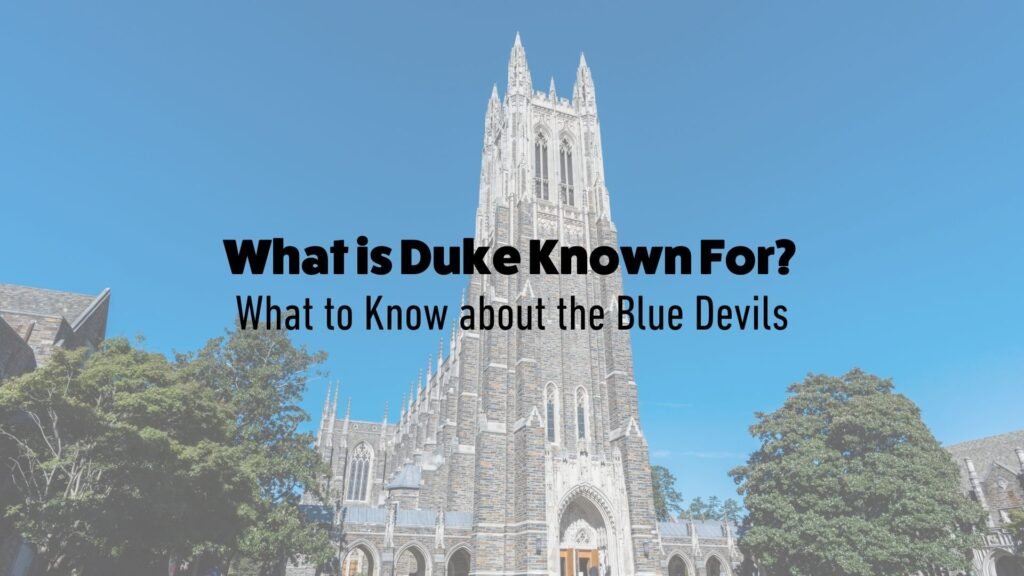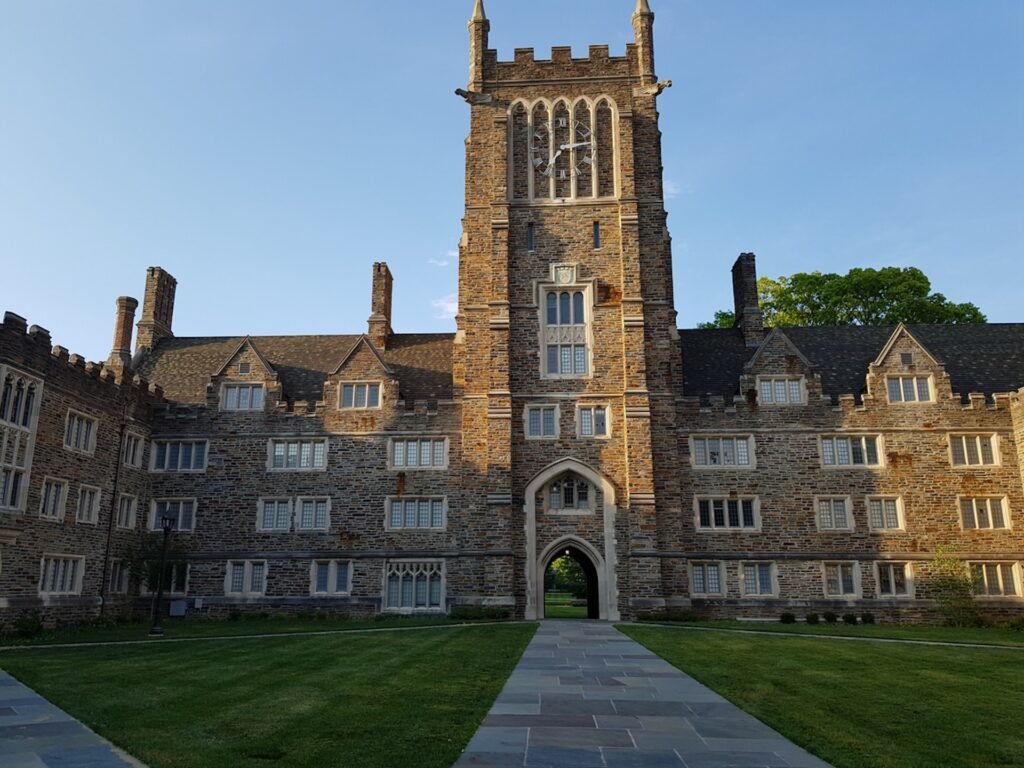Duke University stands as one of the most prestigious institutions in the world, blending a commitment to academic excellence with groundbreaking research, vibrant campus life, and a strong tradition of service. Located in Durham, North Carolina, Duke is renowned for its beautiful campus, diverse academic programs, and thriving community. This article provides a detailed exploration of Duke University, from its rich history and academic strengths to campus culture and notable achievements.
1. A Brief History of Duke University
Duke University traces its roots back to 1838 when it was established as Brown’s Schoolhouse in Randolph County, North Carolina. Over the years, it transformed from a modest preparatory school to Trinity College, eventually evolving into Duke University in 1924, thanks to a generous endowment from James Buchanan Duke. Today, Duke continues to honor its legacy while adapting to the needs of the modern world.
2. Academic Excellence

A. Schools and Programs
Duke University is home to ten schools offering a wide range of undergraduate, graduate, and professional programs. Some of its most notable schools include:
- Trinity College of Arts & Sciences: The cornerstone of Duke’s liberal arts education.
- Pratt School of Engineering: A leader in engineering research and innovation.
- Fuqua School of Business: Renowned for its MBA programs and global reach.
- Duke School of Medicine and Law: Among the top-ranked institutions in their respective fields.
B. Interdisciplinary Approach
Duke emphasizes interdisciplinary learning, allowing students to bridge gaps between fields such as engineering and medicine, public policy and business, or environmental science and law. This approach ensures graduates are well-rounded and equipped to tackle complex global challenges.
3. World-Class Research
Duke University is a hub for groundbreaking research, consistently ranked among the top institutions globally for innovation.
- Focus Areas: Duke excels in areas such as cancer research, artificial intelligence, climate change, and global health.
- Research Centers: Institutions like the Duke Global Health Institute and Duke Energy Initiative drive collaborative solutions to critical issues.
- Student Involvement: Undergraduates have ample opportunities to engage in research, fostering a hands-on learning experience.
4. Campus and Architecture
A. The Gothic Wonderland
Duke’s campus, often referred to as the “Gothic Wonderland,” is renowned for its breathtaking architecture. The iconic Duke Chapel, with its soaring spire, is a symbol of the university and a favorite spot for visitors and students alike.
B. Sustainability Initiatives
The campus integrates sustainability into its infrastructure, boasting LEED-certified buildings and initiatives aimed at reducing carbon emissions and promoting green living.
5. Student Life

A. A Vibrant Campus Community
Duke’s student life is marked by its diversity and engagement. Students hail from all 50 U.S. states and over 100 countries, fostering a global perspective.
B. Clubs and Organizations
With over 400 student organizations, Duke caters to a wide range of interests, including academic clubs, performing arts groups, cultural associations, and more.
C. Athletics and the Blue Devils
Duke’s athletics program, particularly its men’s basketball team, is legendary. Cameron Indoor Stadium, home to the Blue Devils, is a centerpiece of school spirit and rivalry.
6. Commitment to Service and Leadership
A. DukeEngage
This signature program allows students to participate in service-learning projects worldwide, addressing critical issues such as education, health, and the environment.
B. Leadership Development
Duke encourages students to become leaders in their fields and communities through mentorship programs, workshops, and real-world applications.
7. Alumni Achievements
Duke University boasts an impressive list of alumni who have made significant contributions to various fields:
- Tim Cook: CEO of Apple.
- Richard Nixon: 37th President of the United States.
- Melinda French Gates: Co-chair of the Bill & Melinda Gates Foundation.
8. Admissions and Financial Aid
A. Admissions Process
Duke is highly selective, seeking students with strong academic records, extracurricular achievements, and unique talents. The application process includes standardized tests, essays, and interviews.
B. Financial Aid Commitment
Duke is committed to accessibility, offering robust financial aid packages that meet 100% of demonstrated need for all admitted students.
9. Global Impact
Duke extends its influence globally through programs, research collaborations, and a strong alumni network. The Duke Kunshan University in China exemplifies its dedication to global education.
10. Why Choose Duke University?

A. Holistic Education
Duke offers a balanced approach to academics, research, and extracurricular activities, ensuring students develop both intellectually and personally.
B. Unparalleled Opportunities
From cutting-edge labs to international study programs, Duke provides resources that enable students to excel and innovate.
C. Lifelong Community
The Blue Devil community is a lifelong network, offering support, connections, and camaraderie long after graduation.
Also Read : What Are The Admission Requirements For Higher Education?
Conclusion
Duke University’s commitment to excellence is evident in every facet of its operation, from academic rigor and groundbreaking research to a vibrant campus life and global impact. Whether you’re considering applying to Duke or simply seeking to understand its influence, the university’s dedication to shaping leaders and addressing critical challenges makes it a standout institution in the world of higher education.
FAQs
1. What is Duke University best known for?
Duke University is best known for its academic excellence, groundbreaking research, and prestigious programs in areas like medicine, law, business, and engineering. It’s also renowned for its iconic Duke Chapel and a strong tradition of athletics, particularly its men’s basketball team.
2. Where is Duke University located?
Duke University is located in Durham, North Carolina. The campus is known for its stunning Gothic architecture and lush green surroundings.
3. What academic programs does Duke University offer?
Duke offers a wide range of undergraduate, graduate, and professional programs through its ten schools, including the Trinity College of Arts & Sciences, Pratt School of Engineering, Fuqua School of Business, and Duke School of Medicine and Law
4. What is the admissions process like at Duke University?
Duke has a highly selective admissions process, evaluating applicants on academic achievements, extracurricular involvement, personal essays, and standardized test scores. Interviews are optional but recommended for a holistic review.
5. What financial aid options are available at Duke University?
Duke University meets 100% of demonstrated financial need for all admitted students. Financial aid options include grants, scholarships, loans, and work-study programs to make education accessible.
6. What opportunities for research are available at Duke?
Duke is a leader in research, offering students opportunities to work on cutting-edge projects in fields like medicine, artificial intelligence, climate change, and global health. Both undergraduate and graduate students are encouraged to participate in research initiatives.
7. What makes Duke University’s campus unique?
Duke’s campus is often called the “Gothic Wonderland” due to its breathtaking Gothic-style architecture, highlighted by the iconic Duke Chapel. The university also prioritizes sustainability with LEED-certified buildings and green initiatives.





